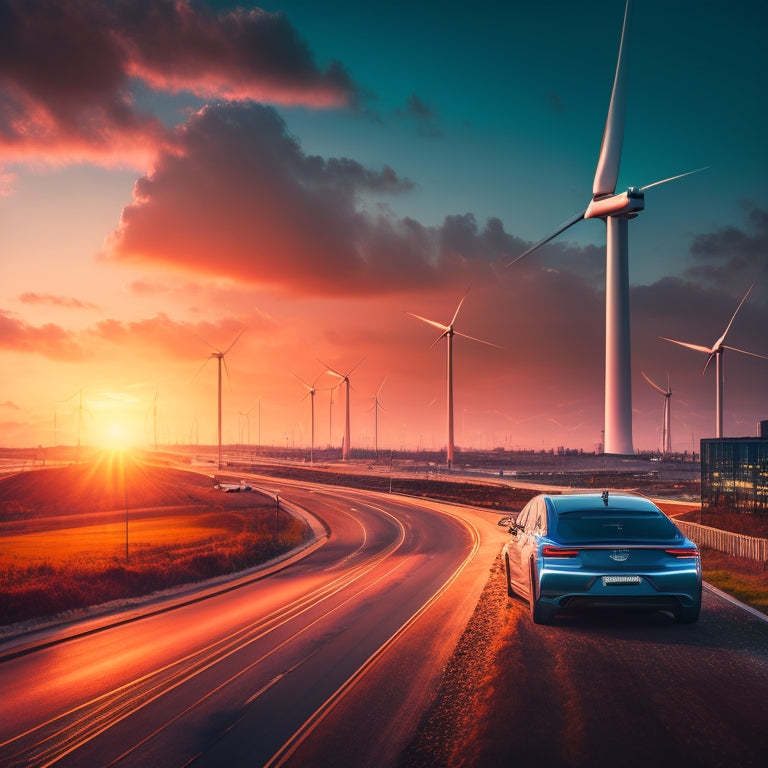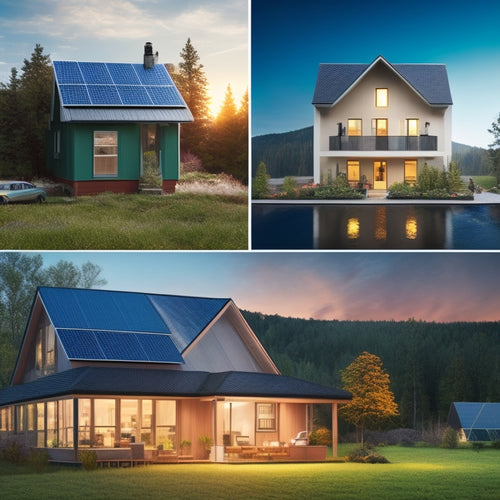
Revolutionizing the Automotive Industry With Electric Cars
Share
The electric vehicle (EV) revolution is transforming the automotive industry, poised to disrupt traditional internal combustion engine dominance with over 1 million EVs predicted to be sold annually by 2015. As the industry shifts towards sustainable transportation, EVs offer a cleaner alternative with zero tailpipe emissions and reduced carbon footprint. Governments and cities are investing in EV infrastructure, driving market growth and expansion. As the industry continues to evolve, advancements in battery technology, autonomous vehicles, and renewable energy integration are redefining the future of transportation - and there's more to come as this transformation unfolds.
Key Takeaways
• Electric vehicles are transforming the automotive industry with a predicted 1 million+ annual sales by 2015, offering a cleaner alternative to traditional engines.
• The global EV market is poised for significant growth, with India's market expected to expand 50-fold by 2020, driven by government support and advancements in battery technology.
• The shift to eco-friendly transportation solutions is driven by increasing demand for sustainable growth, with cities investing in EV infrastructure to support market expansion.
• Advancements in battery technology are improving EV range and efficiency, integrating renewable energy sources to reduce carbon footprint and enhance the appeal of electric vehicles.
• The development of autonomous vehicles is enhancing safety and convenience, with investment in charging infrastructure critical for widespread EV adoption and a sustainable transportation future.
Electric Vehicles on the Rise
As the automotive industry undergoes a noteworthy transformation, electric vehicles (EVs) are poised to revolutionize the market, with predictions suggesting over 1 million units will be sold annually worldwide by 2015.
This increasing adoption is driven by growing environmental concerns, as EVs offer a cleaner alternative to traditional internal combustion engines. The environmental impact of EVs is substantial, with zero tailpipe emissions and a markedly reduced carbon footprint.
As cities like London and Amsterdam invest in EV infrastructure, the market is primed for growth. With major automakers planning to produce hundreds of thousands of EVs yearly, it is clear that the automotive industry is on the cusp of a revolutionary shift towards a more sustainable future.
Market Trends and Forecasts
According to recent market research, the electric vehicle market is poised for significant growth, with projections indicating that India's electric vehicle market will expand 50-fold by 2020, reaching 5 million units.
This rapid expansion is driven by increasing global adoption, as countries worldwide shift to eco-friendly transportation solutions to mitigate environmental impact. The Indian market, in particular, is expected to witness a surge in demand, fueled by government support, advancements in battery technology, and industry investments.
As the market continues to develop, it is essential to monitor market trends and forecasts to understand the changing landscape and identify opportunities for growth. By doing so, stakeholders can work together to promote sustainable transportation solutions that benefit both the environment and society as a whole.
The Future of Automotive Industry
The widespread adoption of electric vehicles is poised to revolutionize the automotive industry, transforming the way vehicles are designed, manufactured, and used. As the industry shifts towards sustainable transportation, technological advancements will play a vital role in shaping its future.
| Trend | Impact on Industry |
|---|---|
| Increased adoption of electric vehicles | Shift from traditional fuel-based vehicles to sustainable transportation |
| Advancements in battery technology | Improved range and efficiency of electric vehicles |
| Integration of renewable energy sources | Reduced carbon footprint of electric vehicles |
| Development of autonomous vehicles | Enhanced safety and convenience features |
| Investment in charging infrastructure | Widespread adoption of electric vehicles |
The future of the automotive industry will be shaped by these trends, leading to a more sustainable, efficient, and innovative industry that serves the needs of a growing population.
Frequently Asked Questions
How Can Governments Incentivize Electric Vehicle Adoption on a Large Scale?
To incentivize large-scale electric vehicle adoption, governments can offer tax credits for individual purchases, fleet incentives for commercial fleets, and public education campaigns to raise awareness about environmental benefits, subsequently driving demand and stimulating market growth.
What Is the Average Lifespan of an Electric Vehicle Battery?
As the iconic phrase "mileage may vary" takes on new meaning, the average lifespan of an electric vehicle battery is approximately 10-15 years, with factors like battery degradation and charging patterns influencing its overall durability and performance.
Can Electric Vehicles Be Charged Using Renewable Energy Sources?
"Electric vehicles can be charged using renewable energy sources, such as solar power, through integration with the Green Grid, enabling a sustainable and carbon-neutral transportation system, leveraging solar infrastructure to reduce dependence on fossil fuels."
Are Electric Vehicles More Expensive to Maintain Than Traditional Cars?
"Just as a well-oiled machine requires periodic tune-ups, electric vehicles (EVs) demand a nuanced approach to maintenance. A cost analysis reveals that EVs, despite higher upfront costs, can offer lower maintenance expenses due to fewer moving parts and optimized maintenance schedules."
Can Electric Vehicles Be Recycled at the End of Their Life Cycle?
At the end of their life cycle, electric vehicles can be recycled through a closed-loop system, where design thinking is applied to optimize material reuse and minimize waste, ensuring a sustainable and environmentally responsible approach.
Related Posts
-

Sustainable Scrubbing: Top Bathroom Solutions for Earth-Conscious Homes
You're taking an important step towards creating a more sustainable home by switching to eco-friendly bathroom cleani...
-

What Does Your Home Energy Audit Report Reveal?
Your home energy audit report reveals a detailed analysis of your energy consumption patterns, highlighting areas of ...
-

7 Blockchain Tools for Home Energy Management
You can utilize blockchain technology to optimize your home's energy management through innovative solutions like blo...


